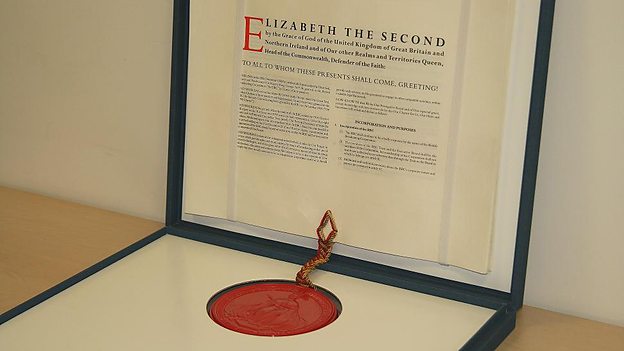It’s that time again. Charter Renewal.
It happens every ten years, but this time the government is openly hostile to the BBC.
So get ready for a blitz on the world’s greatest broadcaster in the coming months. It’s not going to be pretty.

I want to call your attention to one line of attack in particular, because it is a crafty one.
This attack pretends to be generous. It pretends to be kind. It pretends to be a benevolent and noble defence of the poorest in society.
It does this by branding the licence fee as “regressive” – “regressive” because it is a fixed price which does not vary according to income (although it is free for over-75s, many of whom have small incomes, at a mean of below £15,000 in 2011).
This is an old criticism from the Conservative right wing, given new voice by the government’s man in charge of cultural stuff, the recently-appointed John Whittingdale. The Mail has nicknamed him “the minister for BBC-bashing” and he makes no bones about his aversion to the licence fee.
In the long term it is unsustainable… I don’t like the idea of a licence fee, I would prefer to link it perhaps to some other tax, and I think decriminalisation is almost certain to happen… Most people already accept that the licence fee as it is currently structured needs some tweaking… It doesn’t matter how poor you are you still have to pay £145.50 and go to prison if you don’t pay it and a lot of people go to prison every year….
Mr Whittingdale clearly wants us to think that “most people” already agree with him. He must have taken some pleasure in quoting his Labour opposite number in Parliament the other day: Chris Bryant, he reminded us, said in 2005 that elements of the fee were “regressive” because it “falls as a greater percentage of income on the poorest people”.
That quote was, of course, taken out of context – but it doesn’t matter. It doesn’t matter because the key message is that the licence fee is regressive. Even a Labour man said so.
Be in no doubt: the intention here is to toxify the idea of the licence fee, in your mind and mine.
That’ll be why Mr Whittingdale has also called the licence fee “a flat poll tax”. It doesn’t get more toxic than that.
Isn’t he right? What the hell are we doing? We’re landing the poor with a bill of £145.50, and threatening them with prison if they can’t pay. Aren’t those on the Conservative right entirely correct to call this regressive and draconian? What’s so crafty about that?
It’s crafty because branding the licence fee “regressive” makes it sound officially, intellectually, particularly unfair.
Indeed, it calls to mind the very language that people to the left of the Tories deploy when they complain about things like VAT hikes. These people on the left hate regressive taxes, and prefer, if taxes must be raised, the “progressive” variety – those which reflect income. Using the language of the left to outmanoeuvre and confuse opposition is a particular skill of modern Conservatism.
And it’s crafty because I doubt you’ll find many on the left who love the criminalisation of poor folk who can’t pay for their television licence.
But this adoption of the language and sympathy of the left is not just clever.
It is bogus.
First, anything with a set price – which stays the same regardless of your income – can be branded “regressive”. A pint of milk, for example. A loaf of bread. A postage stamp. Their prices do not vary according to your ability to pay. Therefore they are all easier on the pockets of the rich than they are on the poor. They’re all regressive.
Yet you won’t hear many tender-hearted Tories saying the price of milk is “regressive”. It would be meaningless. The price of milk is just the price of milk.
What’s critical is whether the pint of milk is fairly priced. It’s 49p these days, by the way.
And, while we’re there, a postage stamp will set you back 54p, even for second class. But a day’s enjoyment of first-class television and radio will cost you just 39p.
You can call that regressive; I call it great value.
Second, it is not quite true that you can go to prison for not paying the licence fee. You can only go to prison for non-payment of a fine imposed by a court for not having a licence. Prison is a long way down the line in the process. And nor is it true that ‘lots of people go to prison every year’ – there were 32 offenders in 2013 in England and Wales. Which, given the brevity of sentencing, probably means that at any moment in time, there will be just one person in prison for non-payment of licence-fee related fines in England and Wales.
But I’m nitpicking. The precise details of enforcement probably aren’t what matters most in this argument.
The fact that any flat fee can be branded “regressive” probably doesn’t matter much either.
What matters most is that this supposed sympathy for the poor is not, to put it politely, sincere.
It can’t be.
Because if you were a politician who worried sincerely about the incidence of a regressive tax on the poor, you could play no part in this government. A government capable (among other assaults on the poor) of inventing and implementing the bedroom tax, a policy which slashes the incomes of 471,000 housing tenants by an average of £14.92 per week.
These are people whose median income in 2012 was £8996. From whom the government is taking £14.92 per week, or £779 per year.
If you were genuinely worried about the impact of a bill of £145.50 on the poorest households, you would never allow your own government to take £779 from those same people, would you?
Instead, you’d be fighting day and night for that policy to be reversed, repealed and consigned to the dustbin of shameful history – along with the poll tax.
After all, a £779 hit equates to more than five licence fees. With, trust me, none of the entertainment value.
And the burden of this tax falls not just “as a greater percentage of income” on the poorest.
It falls only on the poorest.
It targets them, it humiliates them, it devastates them.
It confronts them with eviction, food banks and debt.
So if you want to champion the poor by reforming taxes, start there, with a tax that really is regressive.
Truly, massively, aggressively regressive.
And if you want to attack the BBC, don’t dress up your arguments as kindness. Try a different tack.
Or better still, take a little pride in a great British achievement – the envy of the world – and don’t attack it at all.

P.S. There’s a pattern in this use of disingenuous arguments. A similar strategy is being deployed to attack the Human Rights Act – see my take here.
Further reading:
Rowntree Foundation Report on Welfare Reform (the Bedroom Tax)
A Strong BBC… by Jean Seaton for Prospect Magazine
Culture Secretary says licence fee hits the poorest hardest – The Telegraph


